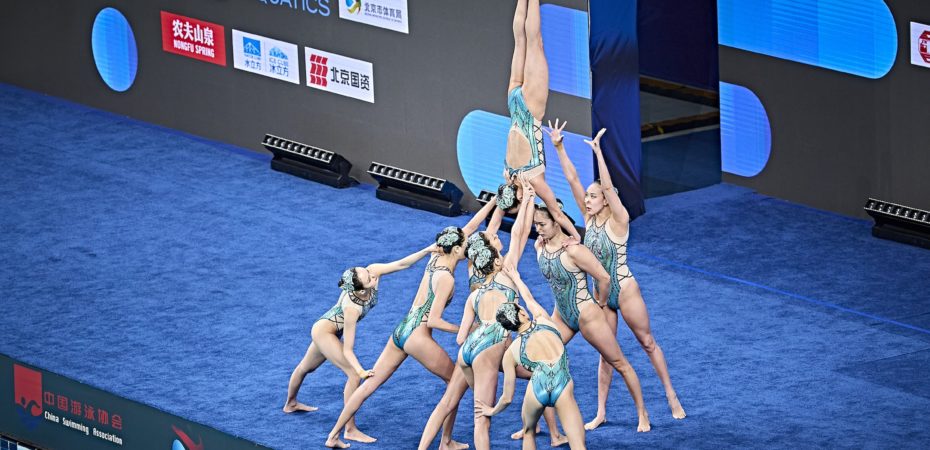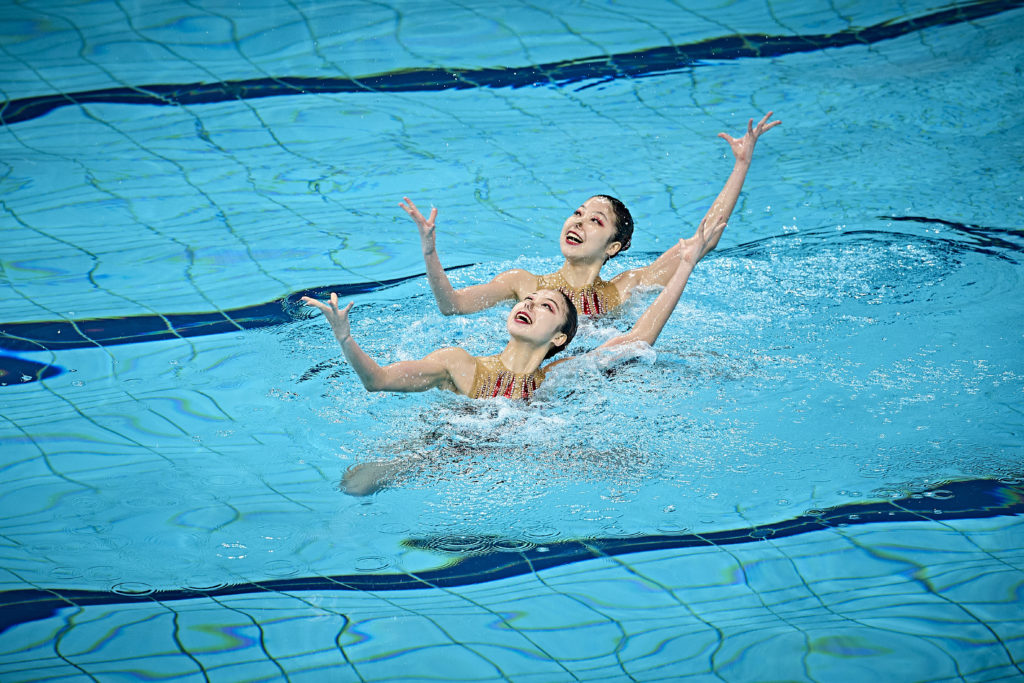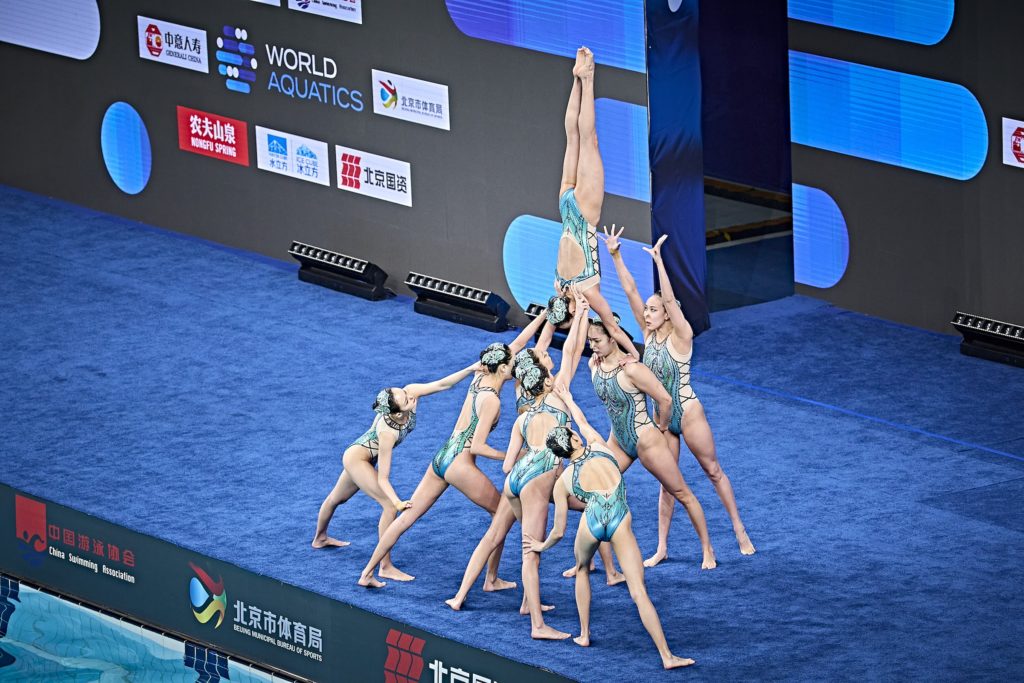The first leg of the 2024 Artistic Swimming World Cup in Beijing showcased a remarkable display of talent, with Chinese athletes dominating the competition. Even with a team mostly comprised of second-string athletes, the hosts displayed undeniable strength and skills, winning nine medals out of 11 possible, including six golds.
This outstanding performance not only highlighted the nation’s depth, but also demonstrated the potential of its up-and-coming athletes, suggesting a promising future for many years to come.
Xu Huiyan, World bronze medalist in the technical solo event in Doha, came out as the most decorated athlete of this competition after clinching three golds in the technical solo, free solo, and technical team, as well as a silver in free duet.
“It’s been a while since we last competed at home, and this being my second international event, I’m genuinely pleased with how I performed,” Xu said. “I have gained much experience at the World Championships in Doha and the Artistic Swimming World Cup this time, which helps me grow and gain maturity. I still need to improve myself and adjust to the new changes to the rules, but the three gold medals really inspire me to forge ahead.”
The 18-year-old was notably coached by seven-time Olympic medalist Huang Xuechen. Huang had been the last Chinese soloist to compete on the international stage back in 2015.
Despite swimming first, the 21-year-old twins Lin Yanhan and Lin Yanjun triumphed in technical duet with a score of 238.8985, before winning silver in the free duet alongside Xu. The sisters had last competed internationally at the 2018 World Junior Championships and were pleased to return in this setting.
“This is our first venture into senior international competition,” Lin Yanhan said. “We feel incredibly fortunate to have had this opportunity. Though nervous at first, the resounding cheers from our teammates, family, and passionate Chinese fans in the stands infused us with an incredible surge of power and energy. We far surpassed our own expectations.”
Coach Li Min was also satisfied with the performance of the twins:
“This is their first time to compete in such high-level events. We have achieved our goals for this World Cup. I believe they can do better technically and continue to make progress in the future.”
The young pair of Guo Muye and Ji Heyue won the technical mixed duet event with a score of 206.8800 in a major upset against the reigning World Champions from Kazakhstan, who received a basemark on their first free hybrid.
Guo Muye also came away with silver in technical solo, and a fourth-place finish in free solo. In the latter, he had declared a massive 40.55 in Degree of Difficulty (DD), the highest of the field. Sadly, he perhaps bit off more than he could chew at this time, and had two basemarks which pushed him out of the podium.
The 15-year-old also had his twin brother Guo Muxi compete in Beijing. Muxi only focused on the free mixed duet, where he placed fourth alongside Gu Jiayu.
“We executed better than in training, but we still have a long way to catch up with the top senior swimmers,” Muxi said. “I give myself… 7.5 points out of 10 because I realize my weaknesses. I was not physically strong enough and could not do some high difficult movements.”
Hailing from Beijing, the twin brothers were raised against the backdrop of the 2008 Olympic Games and learned to swim in this iconic Water Cube. They were thrilled to appear at their first international competition in a pool they know so well.
“We are familiar with the Water Cube pool very much,” Muxi continued. “We have trained and competed many times here. It is like going home. But competing in a World Cup made me different and nervous.”
The top-level athletes who are all vying for a spot on the Chinese Olympic team only competed in the free team event here. The Chinese squad showcased its stunning “Gravitation” routine, naturally adapted to the latest difficulty requirements, yet still boasting an increase of 0.20 in DD since the Doha World Championships. After being credited their full difficulty of 56.60, the Chinese scored 343.3479 to comfortably win gold.
“We’ve really done a commendable job in putting the new rules to the test and evaluating our understanding,” head coach Zhang Xiaohuan said. “It’s our desire to see the sport embrace a greater variety of movements and exude an even more elegant essence.
“Before the Paris Olympics, we will compete in three more World Cup stages, and will probably use a different difficulty strategy for each, choosing the moves that make the most sense and suit our athletes best for the Olympics,” she added. “Our goal is to amaze the whole field and have every second be wonderful, so that the judges and spectators are always in a state of shock and admiration. It’s not easy to do this, but we always believe that Chinese athletes can do it.”
Vasilina Khandoshka, competing again under the Neutral Individual Athletes banner, unveiled two new solo routines in Beijing. In the technical event, she performed to the famous song “I will survive” by Gloria Gaynor, which helped her claim silver with 234.8867. In free solo, she chose the theme of “Cleopatra”, seemingly retiring her “After Dark” routine that helped her to a World bronze a few months ago.
Continuing with the solos, Spain’s Isabel Shuang Cui Xu earned silver in the free event with a 206.7833. For her first international assignment on the senior stage, the 17-year-old was quite delighted to compete in Beijing.
“I was born and raised in Spain, but my parents are Chinese,” she said. “I was excited to show myself in this Olympic venue. Many of my relatives in China came to watch me compete today and to cheer for me!”
Both solo bronze medalists chose to interpret the theme of “Love” for their routines. Kyra Hoevertsz claimed third place in the technical event with a score of 211.1767, earning Aruba’s first medal on the World Cup stage. In free, Marloes Steenbeek of the Netherlands scored 198.0792 after swimming to “Golden Hour” by JVKE.
Unfortunately, Karina Magrupova of Kazakhstan was disqualified in free solo after a wardrobe malfunction at the start of her routine. She missed the first 20 seconds or so of her routine as she was struggling to clasp and tighten her swimsuit. She eventually succeeded and caught up with her routine, fully getting into her “scary doll” character. Sadly, it didn’t make a difference in the end.
On the men’s side, Jordi Caceres of Spain performed to “Respect” by Aretha Franklin to win gold in technical solo with 190.8916. The 19-year-old was overall outstanding in his first-ever international competition. He claimed silver in free solo and two bronze medals in the mixed duet events, competing alongside Emma Garcia and Judith Calvo.
Caceres took up artistic swimming in 2019, only a few months before the pandemic hit. As a fun anecdote, Spain had forgone gelatine since the pandemic started for its domestic competitions, and has only allowed swim caps. That has actually stayed in place since, so this was also his first competition swimming without a cap!
Coming back from a disappointing swim and four basemarks in the technical solo, reigning World Youth champion Filippo Pelati of Italy claimed gold in free solo. Swimming to a remix of A-ha’s “Take on Me”, the 17-year-old scored 174.5979. Pelati was joined at the top of the podium by Flaminia Vernice in the free mixed duet thanks to a score of 175.9655.
The Olympic duet of Israel, represented by Shelly Bobritsky and Ariel Nassee, claimed gold in the free event with a score of 225.7613, although they did receive a small basemark on their acrobatic pair movement. It was a great comeback from the pair after missing the podium in the technical duet by only 0.8 points.
Finally, the last remaining gold went to Kazakhstan in acrobatic team with 213.7801 for its “Night on Bald Mountain” routine. In that event, the Chinese had declared the highest DD of the field with 22.75 but received a basemark on their opening acro. Their strong execution and artistic impression weren’t enough to save them, and they dropped to second. Overall, Kazakhstan came away with five medals in Beijing, also earning two silvers and two bronzes.
Team Australia continued to show impressive progress and made history by winning its first medals on the artistic swimming World Cup circuit. The squad, gearing up for the Paris Olympics in a few months, won silver in the technical and free team events, and bronze in the acrobatic team.
The duet of Chiara Diky and Lea Anna Krajcovicova of Slovakia earned bronze with its “Robots” routine in the technical duet with a score of 207.7218. In the free event, Daniela Avila and Fernanda Carmona, one of the two junior duets representing Mexico here, placed third with their “Spanish dance” routine.
Next, the World Cup heads to Paris at the beginning of May for the second stop of the series; a competition that will be held in the newly-built and inaugurated Olympic Aquatic Centre.
ARTICLE BY CHRISTINA MARMET
Photos courtesy of the LOC / Organizing Committee.
If you’ve enjoyed our coverage, please consider donating to Inside Synchro! Any amount helps us run the site and travel costs to cover meets during the season.



